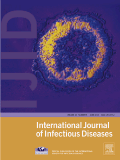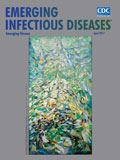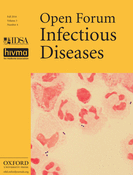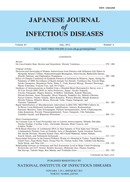
INTERNATIONAL JOURNAL OF INFECTIOUS DISEASES
Scope & Guideline
Elevating the discourse on infectious disease science.
Introduction
Aims and Scopes
- Epidemiology and Public Health:
The journal consistently emphasizes the epidemiological aspects of infectious diseases, including prevalence, incidence, and demographic factors influencing disease spread and outcomes. - Clinical Research and Treatment Outcomes:
A significant portion of published research focuses on clinical trials, treatment efficacy, and management strategies for various infectious diseases, highlighting outcomes in diverse patient populations. - Vaccine Development and Immunization Strategies:
The journal features studies on vaccine efficacy, immunogenicity, and the public health implications of vaccination programs, especially in the context of emerging infectious diseases. - Antimicrobial Resistance:
Research addressing the growing concern of antimicrobial resistance, including surveillance, resistance mechanisms, and strategies to combat resistant infections, is a recurrent theme. - Infectious Disease Pathogenesis and Microbiology:
The journal publishes studies on the microbiological aspects and pathogenesis of infectious diseases, providing insights into the underlying mechanisms of infection and disease progression. - Global Health Perspectives:
The journal includes articles that explore infectious disease challenges in low- and middle-income countries, emphasizing the importance of equitable health solutions and global health security.
Trending and Emerging
- COVID-19 Research:
A significant trend is the extensive research related to COVID-19, encompassing virology, epidemiology, treatment efficacy, vaccine development, and long-term effects of infection. - Mental Health and Infectious Diseases:
There is an emerging focus on the mental health implications of infectious disease outbreaks, particularly in relation to the psychological impact of the COVID-19 pandemic on various populations. - One Health Approach:
The journal increasingly features studies applying the One Health framework, which integrates human, animal, and environmental health to address infectious disease threats comprehensively. - Telemedicine and Remote Care:
Research on the role of telemedicine and digital health solutions in managing infectious diseases has gained prominence, reflecting changes in healthcare delivery models during the pandemic. - Innovative Diagnostics and Surveillance Technologies:
Emerging themes include the development and evaluation of novel diagnostic tools and surveillance methodologies for rapid detection of infectious diseases, particularly for outbreaks.
Declining or Waning
- Non-communicable Disease Associations:
The journal's previous emphasis on the intersection of infectious diseases with non-communicable diseases has waned, as the focus has shifted more towards acute infectious disease management and COVID-19-related research. - Traditional Infectious Diseases:
There appears to be a reduction in studies centered on traditional infectious diseases, such as tuberculosis and malaria, in favor of more contemporary issues such as COVID-19 and emerging zoonotic diseases. - Historical Epidemiological Studies:
Research exploring historical data on infectious diseases has decreased, reflecting a shift towards current epidemic responses and real-time data analysis. - Regional Studies of Infectious Diseases:
There has been a noticeable decline in region-specific studies focusing on endemic diseases, as the journal increasingly prioritizes global perspectives and broader public health implications.
Similar Journals

Biosafety and Health
Uniting disciplines to tackle pressing health challenges.Biosafety and Health is a leading peer-reviewed journal published by ELSEVIER, dedicated to advancing knowledge and practice in the fields of biotechnology, infectious diseases, microbiology, and public health. With an ISSN of 2096-6962 and an E-ISSN of 2590-0536, this Open Access journal has been accessible to the global research community since 2019, fostering collaboration and innovation from its base in the Netherlands. Ranked Q2 in multiple categories according to the latest metrics, including Biotechnology and Microbiology (medical), it stands as a testament to high-quality, impactful research that influences clinical and environmental practices. The journal has achieved substantial recognition in various medical fields, ranking in the 88th percentile for Public Health, Environmental and Occupational Health, and the 78th percentile for Infectious Diseases. Researchers and practitioners seeking to contribute to this evolving domain are encouraged to submit their findings, as the journal aims to promote interdisciplinary dialogue and address pressing global health challenges.

INFECTION
Exploring Innovations in Infection MedicineINFECTION is a prestigious journal, published by Springer Heidelberg, that serves as a leading platform for the dissemination of critical research in the fields of Infectious Diseases, Microbiology, and Medicine. With an impressive Q1 ranking in multiple categories such as Infectious Diseases, Medicine (miscellaneous), and Medical Microbiology, the journal is recognized for its high-quality content and impactful contributions to the scientific community, as evidenced by its Scopus rankings placing it in the top 10th percentiles. Since its inception in 1973, and projected to continue until 2024, INFECTION has established itself as a vital resource for researchers, healthcare professionals, and students keen to explore the latest findings and advancements in infectious diseases. The journal provides a rigorous peer-review process, ensuring that only high-quality studies are published, making it an essential read for those seeking to deepen their understanding and stay abreast of the rapidly evolving landscape in infection research.

Eurosurveillance
Empowering researchers with cutting-edge insights.Eurosurveillance is a prestigious journal dedicated to the field of epidemiology, public health, and infectious diseases, published by the European Centre for Disease Prevention and Control since 1996. With an impressive Q1 ranking across various categories, including Epidemiology and Public Health, it consistently stands at the forefront of research dissemination, making it an invaluable resource for researchers, professionals, and students alike. The journal boasts an outstanding reputation, as evidenced by its Scopus rankings, where it ranks in the top 1% to 3% in multiple relevant categories. As an Open Access publication, Eurosurveillance ensures that vital findings are freely accessible to a global audience, fostering collaboration and innovation in the fight against infectious diseases. With a dedicated reach from 2001 to 2024, the journal addresses contemporary challenges in public health and virology, reinforcing its significance in shaping policies and research initiatives across the world.

Reviews and Research in Medical Microbiology
Your Essential Resource for Medical Microbiology AdvancementsReviews and Research in Medical Microbiology is a premier academic journal published by LIPPINCOTT WILLIAMS & WILKINS, focusing on groundbreaking research and comprehensive reviews that advance the understanding of medical microbiology. With an ISSN of 2770-3150 and an E-ISSN of 2770-3169, this journal serves as an essential resource for researchers, healthcare professionals, and students dedicated to the study of pathogens, infectious diseases, and microbial mechanisms affecting health. While the journal currently does not offer open access, its rigorous peer-review process ensures that only high-quality, impactful research is disseminated to the scientific community. The journal aims to bridge gaps in knowledge by presenting cutting-edge studies that explore novel therapeutic strategies, diagnostic methods, and the evolving landscape of microbial resistance. Nestled in the heart of Philadelphia, this journal proudly contributes to the advancement of medical microbiology and is an indispensable platform for the publication of critical findings that shape clinical practices and research trajectories in the field.

Archives of Clinical Infectious Diseases
Fostering Excellence in Clinical Infectious Disease ScholarshipArchives of Clinical Infectious Diseases is a peer-reviewed journal dedicated to advancing knowledge in the field of infectious diseases, published by BRIEFLAND in Iran. With a broad scope, it covers various aspects of cardiology, critical care, immunology, microbiology, public health, and toxicology, affirming its relevance in today's health landscape. Despite the lack of open access options, the journal maintains a strong reputation, reflected in its Q3 ranking in multiple categories within the 2023 category quartiles. The journal aims to provide a platform for researchers and practitioners to disseminate critical findings that can impact clinical practices and public health policies. Its commitment to rigorous peer review ensures that only high-quality research is published, thereby serving as an essential resource for professionals, students, and public health advocates. For those engaged in the ever-evolving world of infectious diseases, Archives of Clinical Infectious Diseases stands as a vital contribution to the medical literature.

EMERGING INFECTIOUS DISEASES
Exploring Innovations in Infectious Disease ManagementEmerging Infectious Diseases, published by the Centers for Disease Control and Prevention, is a leading open-access journal that has been dedicated to the field of epidemiology, infectious diseases, and medical microbiology since its inception in 1995. With an impressive impact factor placing it in the Q1 quartile rankings for multiple categories including Epidemiology, Infectious Diseases, and Medical Microbiology, this journal serves as a vital resource for researchers, practitioners, and students dedicated to combating the challenges posed by emerging infectious diseases. The journal's distinguished Scopus ranks further highlight its global influence, ranking #10 in Epidemiology, #26 in Infectious Diseases, and #13 in Medical Microbiology, all within the top percentiles. Accessible and targeted, Emerging Infectious Diseases publishes seminal research and reviews that contribute to the understanding and management of infectious diseases, ensuring that critical insights reach a broad audience. The journal encourages contributions that advance the scientific community’s knowledge and responses to public health challenges.

New Microbes and New Infections
Bridging gaps in understanding novel infectious agents.New Microbes and New Infections is an esteemed peer-reviewed journal published by Elsevier Sci Ltd that has been a prominent platform for disseminating groundbreaking research in the fields of Infectious Diseases and Microbiology since its establishment in 2013. With an impressive Open Access model, this journal ensures that vital research findings are readily accessible to researchers, healthcare professionals, and academics worldwide. Positioned in the Q2 category for Infectious Diseases and Q3 for Microbiology in 2023, it reaches a significant global audience, as demonstrated by its high Scopus rankings—#44 out of 344 in Medicine: Infectious Diseases, and #34 out of 182 in Immunology and Microbiology. The journal aims to inspire new ideas and foster collaborations by publishing high-quality research focused on novel microbes and infections, thus playing a crucial role in advancing science and public health in an era where understanding infectious agents is more vital than ever.

Open Forum Infectious Diseases
Advancing knowledge in infectious diseases.Open Forum Infectious Diseases (ISSN: 2328-8957; E-ISSN: 2328-8957) is a leading open-access journal published by Oxford University Press, dedicated to advancing the field of infectious diseases. Since its inception in 2014, the journal has provided a platform for researchers to disseminate impactful findings in a rapidly evolving domain, achieving a remarkable Q1 ranking in both the Infectious Diseases and Oncology categories as of 2023. The journal encourages rigorous and innovative research, contributing significantly to global health discussions and informing best practices in clinical settings. As an open-access journal, it ensures that its content is accessible to a wide audience, fostering collaboration and knowledge sharing among researchers, professionals, and students alike. Positioned in the heart of the United States, Open Forum Infectious Diseases serves as a critical resource for the academic community, and its continued commitment to quality and relevance secures its status as an essential publication in the field.

JAPANESE JOURNAL OF INFECTIOUS DISEASES
Connecting research with public health for a healthier future.The Japanese Journal of Infectious Diseases, published by the National Institute of Infectious Diseases in Japan, serves as a vital platform for researchers, clinicians, and public health professionals committed to advancing the field of infectious disease science. With an ISSN of 1344-6304 and an E-ISSN of 1884-2836, this journal has maintained its academic rigor since its inception in 1961 and continues to contribute significantly to the global understanding of infectious diseases. The journal holds a Q3 ranking in the categories of Infectious Diseases, Miscellaneous Medicine, and Medical Microbiology as of 2023, reflecting its important role in disseminating impactful research. With many articles available through Open Access, it ensures wide accessibility to the latest discoveries and insights. Researchers can expect to find high-quality studies that address critical challenges in the control and prevention of infectious diseases, making this journal an essential resource for anyone engaging in this critical field.

Infectious Diseases and Clinical Microbiology
Innovating solutions for global infectious disease challenges.Infectious Diseases and Clinical Microbiology is a pivotal journal dedicated to advancing our understanding of infectious diseases through rigorous scientific research and clinical practices. Published by DOC DESIGN INFORMATICS CO LTD, this journal serves as a vital platform for researchers, healthcare professionals, and students keen on enhancing their knowledge of microbiological sciences and the clinical implications of infectious agents. With an ISSN of 2667-646X, it aims to disseminate significant findings in the field, enriching the scholarly dialogue surrounding infectious diseases. While currently operating under a traditional access model, the journal encourages global collaboration and knowledge sharing, striving to make a meaningful impact in tackling the challenges posed by infectious diseases. Its content aims to bridge the gap between laboratory research and clinical application, making it an essential resource in the contemporary landscape of global health.